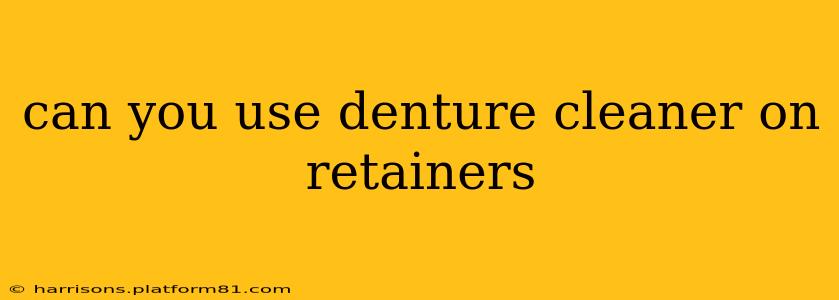Can You Use Denture Cleaner on Retainers? A Comprehensive Guide
Many people wonder if denture cleaners are safe to use on retainers. The short answer is: it depends. While some denture cleaners might work, it's generally not recommended, and doing so can risk damaging your retainer and potentially harming your oral health. This article will delve into the reasons why, explore safer alternatives, and address some frequently asked questions.
Why You Shouldn't Use Denture Cleaner on Retainers
Denture cleaners are formulated for dentures, which are significantly more robust and durable than retainers. Retainers are typically made from delicate materials like plastic (acrylic or polyethylene) or metal (wire), and the harsh chemicals in many denture cleaners can:
- Damage the retainer material: The strong cleaning agents can erode or weaken the plastic, causing cracks, discoloration, or even complete breakdown of the retainer. Metal retainers can also be affected, potentially leading to corrosion or weakening of the wire.
- Leave behind harmful residues: Even after rinsing, traces of the cleaning agents can remain, potentially irritating your gums or causing allergic reactions.
- Void the warranty: Using a cleaning method not recommended by your orthodontist or dentist can void any warranty on your retainer.
What are the safer alternatives for cleaning retainers?
Fortunately, there are many gentle and effective ways to clean your retainers without risking damage:
- Brushing: The most straightforward method is gently brushing your retainer with a soft-bristled toothbrush and a mild soap (like dish soap) and water. Be sure to brush all surfaces thoroughly.
- Soaking: Soaking your retainer in a solution of water and a denture-safe cleaning tablet (not a general denture cleaner) can help remove stubborn stains and plaque. Always follow the instructions on the cleaning tablet packaging. Avoid soaking it for extended periods, as this can weaken the material.
- Using a retainer cleaning solution: Many commercially available retainer cleaning solutions are specifically formulated to be gentle yet effective. These are typically designed to be less abrasive and less likely to damage your retainer.
- Professional cleaning: Ask your orthodontist or dentist about professional retainer cleaning services. They can provide deep cleaning and check for any signs of damage or wear.
What are the best cleaning practices for retainers?
Beyond the choice of cleaner, maintaining proper hygiene is crucial for preserving your retainer's lifespan:
- Clean your retainer every day: This prevents the buildup of bacteria and food particles, which can lead to bad breath and gum disease.
- Store your retainer properly: When not in your mouth, keep your retainer in its case to prevent damage or loss.
- Rinse your retainer after every use: This removes food particles and saliva that can build up.
- Keep your retainer away from extreme temperatures: Heat and cold can warp or damage the retainer material.
Can I use baking soda to clean my retainer?
While baking soda is a mild abrasive and can help remove some stains, it's essential to use it sparingly and with caution. Excessive use could scratch or dull the surface of your retainer. Mix a tiny amount of baking soda with water to create a paste, then gently brush your retainer. Always rinse thoroughly afterward.
How often should I replace my retainer?
The lifespan of a retainer varies depending on individual usage and care. It’s crucial to follow your orthodontist's recommendations, but generally, retainers should be replaced every 1-3 years, or sooner if they show signs of significant wear and tear.
By following these guidelines and opting for gentle cleaning methods, you can keep your retainer clean, healthy, and extend its lifespan. Remember, consulting your orthodontist or dentist is always the best way to ensure the proper care and maintenance of your retainer.
